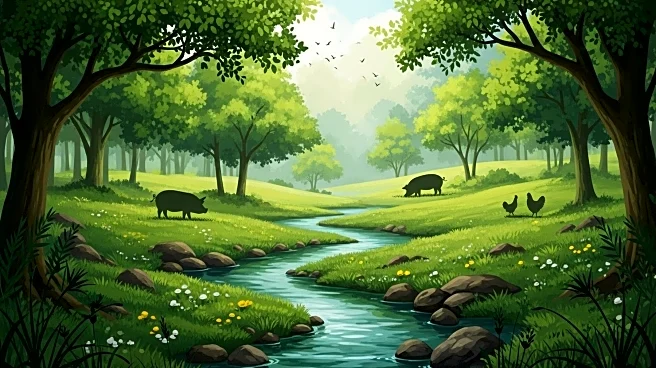What is the story about?
What's Happening?
A report by the Wildlife Trusts has revealed significant environmental pollution caused by the pig and poultry farming sectors in the UK. The study, conducted by Cumulus Consultants, highlights that waste from these sectors amounts to approximately 10.4 million cubic meters annually, equivalent to 4,160 Olympic-sized swimming pools. This waste, rich in nutrients like nitrogen and phosphorus, poses challenges for sustainable use on farmland and leads to pollution in rivers, affecting water quality and freshwater wildlife. The report identifies specific 'hotspots' where production is concentrated, exacerbating the pollution problem. Additionally, it notes that over a third of the UK's wheat crop is used for pig and poultry feed, contributing to further environmental harm through the use of fertilizers and pesticides.
Why It's Important?
The findings underscore the environmental impact of intensive pig and poultry farming, which not only affects water quality but also threatens biodiversity in affected areas. The concentration of farming activities in certain regions increases the risk of pollution, necessitating urgent action to mitigate these effects. The report calls for government and industry support to transition to less polluting farming practices, which is crucial for meeting legally binding environmental targets. The reliance on large areas of land for feed production also highlights the broader ecological footprint of these industries, emphasizing the need for more sustainable agricultural practices.
What's Next?
Conservationists are urging the government and industry to support farmers in adopting more integrated and sustainable farming systems. This shift is essential to reduce pollution, protect water quality, and help meet environmental targets. The report suggests that changes in farming practices could lead to cleaner rivers and healthier ecosystems, benefiting both wildlife and human communities. Stakeholders may need to collaborate on policy changes and provide resources for farmers to implement these practices effectively.
Beyond the Headlines
The report raises ethical questions about the sustainability of current farming practices and their long-term impact on the environment. It highlights the need for a balance between food production and environmental conservation, which could lead to significant shifts in agricultural policy and consumer behavior. The focus on pollution hotspots also suggests potential regulatory changes to address these concentrated areas of environmental harm.
















